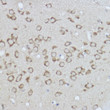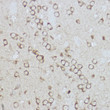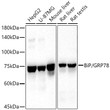| Post Translational Modifications | AMPylated by FICD. In unstressed cells, AMPylation at Thr-518 by FICD inactivates the chaperome activity: AMPylated form is locked in a relatively inert state and only weakly stimulated by J domain-containing proteins. In response to endoplasmic reticulum stress, de-AMPylation by the same protein, FICD, restores the chaperone activity. |
| Function | Endoplasmic reticulum chaperone that plays a key role in protein folding and quality control in the endoplasmic reticulum lumen. Involved in the correct folding of proteins and degradation of misfolded proteins via its interaction with DNAJC10/ERdj5, probably to facilitate the release of DNAJC10/ERdj5 from its substrate. Acts as a key repressor of the EIF2AK3/PERK and ERN1/IRE1-mediated unfolded protein response (UPR). In the unstressed endoplasmic reticulum, recruited by DNAJB9/ERdj4 to the luminal region of ERN1/IRE1, leading to disrupt the dimerization of ERN1/IRE1, thereby inactivating ERN1/IRE1. Also binds and inactivates EIF2AK3/PERK in unstressed cells. Accumulation of misfolded protein in the endoplasmic reticulum causes release of HSPA5/BiP from ERN1/IRE1 and EIF2AK3/PERK, allowing their homodimerization and subsequent activation. Plays an auxiliary role in post-translational transport of small presecretory proteins across endoplasmic reticulum (ER). May function as an allosteric modulator for SEC61 channel-forming translocon complex, likely cooperating with SEC62 to enable the productive insertion of these precursors into SEC61 channel. Appears to specifically regulate translocation of precursors having inhibitory residues in their mature region that weaken channel gating. May also play a role in apoptosis and cell proliferation. (Microbial infection) Plays an important role in viral binding to the host cell membrane and entry for several flaviruses such as Dengue virus, Zika virus and Japanese encephalitis virus. Acts as a component of the cellular receptor for Dengue virus serotype 2/DENV-2 on human liver cells. (Microbial infection) Acts as a receptor for CotH proteins expressed by fungi of the order mucorales, the causative agent of mucormycosis, which plays an important role in epithelial cell invasion by the fungi. Acts as a receptor for R.delemar CotH3 in nasal epithelial cells, which may be an early step in rhinoorbital/cerebral mucormycosis (RCM) disease progression. |
| Protein Name | Endoplasmic Reticulum Chaperone Bip78 Kda Glucose-Regulated ProteinGrp-78Binding-Immunoglobulin ProteinBipHeat Shock Protein 70 Family Protein 5Hsp70 Family Protein 5Heat Shock Protein Family A Member 5Immunoglobulin Heavy Chain-Binding Protein |
| Database Links | Reactome: R-HSA-114608Reactome: R-HSA-3371453Reactome: R-HSA-381033Reactome: R-HSA-381042Reactome: R-HSA-381070Reactome: R-HSA-381183Reactome: R-HSA-8874177Reactome: R-HSA-983170 |
| Cellular Localisation | Endoplasmic Reticulum LumenMelanosomeCytoplasmCell SurfaceIdentified By Mass Spectrometry In Melanosome Fractions From Stage I To Stage IvLocalizes To The Cell Surface Of Epithelial Cells In Response To High Levels Of Free Iron |
| Alternative Antibody Names | Anti-Endoplasmic Reticulum Chaperone Bip antibodyAnti-78 Kda Glucose-Regulated Protein antibodyAnti-Grp-78 antibodyAnti-Binding-Immunoglobulin Protein antibodyAnti-Bip antibodyAnti-Heat Shock Protein 70 Family Protein 5 antibodyAnti-Hsp70 Family Protein 5 antibodyAnti-Heat Shock Protein Family A Member 5 antibodyAnti-Immunoglobulin Heavy Chain-Binding Protein antibodyAnti-HSPA5 antibodyAnti-GRP78 antibody |
Information sourced from Uniprot.org














